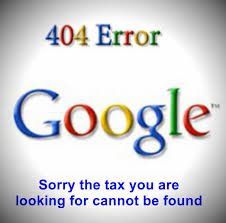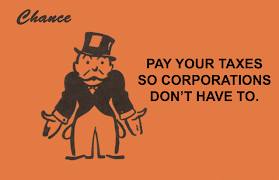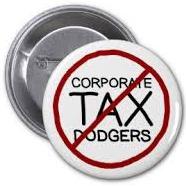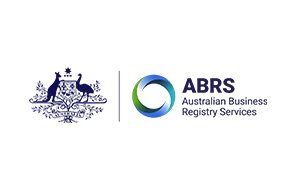Corporate Tax Dodge - Why Can't Small Businesses Do It?
 |
Lead ing up to and beyond G20 summit in Brisbane earlier this year, news has been rift about multinational corporates using tax havens to dodge higher corporate taxes. US, Australia, UK, Europe, China, India, you name it, economies are worried about erosion of their base corporate tax. So much so, there is now a new term for this on the blocks; Base Erosion and Profit Shift (BEPS) . It's not just multinationals like Google and Apple, but also our own backyard multinationals including top banks who are said to be using BEPS to avoid local taxes. Cayman Islands, Luxembourg, Switzerland, Bermuda, Ireland etc., have become commonly ill-famous as Tax Havens for their low corporate tax rate and corporate secrecy. |
Australian Commission of Tax, Chris Jordan, Prime Minister Tony Abbot and Treasurer Joe Hockey have all gone on record pledging strong action to bring back to Australia it's fair share of corporate tax. Needless to say the less tax corporates pay, the more mum and dads have to pay!
| || Often small businesses ask, 'Why can't we do the same?'. It's hard to convince clients to do the right thing while the news is broadcasting multinationals dodging the corporate tax. Needless to say, the less tax corporates pay, the more mums and dads have to pay! || |  |
SO HOW DOES IT WORKS?
BEPS works primarily on two concepts: Transfer Pricing and Thin Capitalisation . Take for example, a smart phone is produced in China for say $100 and shipped to Australia for sale. While it is at sea, a transaction is made, only on paper ofcourse, where it is sold for $100 to say a company in Cayman Islands. This company then sells it to an Australian Company for $600 which sells it in a store in Australia for $700. Thus $500 profit is shifted from high tax region of China or Australia to a low tax region of Cayman Islands. Ofcourse all these companies are fully owned by either an American or European Smart Phone company. This is called Transfer Pricing. Unfortunately, corporate are taxed currently based on their residency status, hence profits generated by Cayman Island subsidiary can not be taxed in China or Australia.
This ofcourse leads to substantial funds (tax free profits) locked in these tax haven companies. Next step is to then lend these funds to high tax group companies at a high interest rate. Thus while a tax deduction of say 30% is claimed on interest paid by an Australian Subsidiary, there is virtually no tax paid on interest income earned by the Cayman Island Subsidiary. This is called Thin Capitalisation. Again, weak tax policies and lack of unified global approach just make this too simple.
Some estimates indicate hundreds of billions of corporate tax is 'dodged' by multinationals using these strategies each year. Poorer tax haven economies don't mind flush of funds helping them prosper.
SO WHY CAN'T SMALL BUSINESSES DO IT?
The key difference is in separation of ownership and control. Multinationals are controlled by directors and executives who may own a small portion of the company through listed shares or may not own any shares. They earn salaries, bonuses and incentives, often in millions of dollars. Make no mistake, to this extent they pay top dollar tax! And their pay pack continues to rise as the company's profits increases, partly helped by this corporate tax dodge. In essence, livelihood of these executives is not dependent on the cash profits made and dumped in tax haven bank accounts.
In contrast, the owners of small businesses live on the profit of their companies. Even if they could use BEPS to 'legally' reduce their corporate tax, they can't afford to leave their profits in the tax haven bank accounts. And the moment they dip in and bring back these cash reserves, they are taxed on this money in their local economy.
Thus, even if small businesses could afford the high costs multinationals pay to top end tax advisors from companies like KPMG, Ernst & Young etc. to achieve corporate tax dodge, the fact that they live on their profits makes the whole exercise futile.
IS THERE HOPE FOR AUSTRALIAN MUMS AND DADS?
While publicly Australian and other international authorities have made a lot of noise on curbing BEPS, little seems to have been achieved. At best, G20 countries have agreed for better information sharing across international tax authorities and banks. On the contrary, as per public news, ATO's budget cuts seems to have depleted it's Counter-BEPS work force, some of whom have joined the big four tax advisors firms sharing inside information on ATO's capabilities and inabilities!
 |
|| At last count, Treasurer Hockey indicated that Australia will join UK in bringing in a 'Google' tax to curb BEPS. || |
I guess, the situation is well summed up by former treasurer Peter Costello, in his advise to Abott's government, "In the world of electronic transfer and the internet, and mobile capital, and mobile income, your best tax bases are always going to be ones that are local,". Based on this, the current chairman of 'Future Fund' seems to suggest it is better to raise GST and personal tax rates rather than curb tax evasion by multinationals. Interestingly, reports suggest Future Fund, a government owned body, is itself guilty of using tax havens to avoid tax!
Some analysts seem to think, whatever governments may do, corporate tax payers and advisors will always be one step ahead! Hard working Mums and dads thus live in this (possibly falsified) hope that someday these multinationals will pay their fair share of taxes bringing prosperity and lower taxes on us, the mums and dads!

Join MGAA's Community






